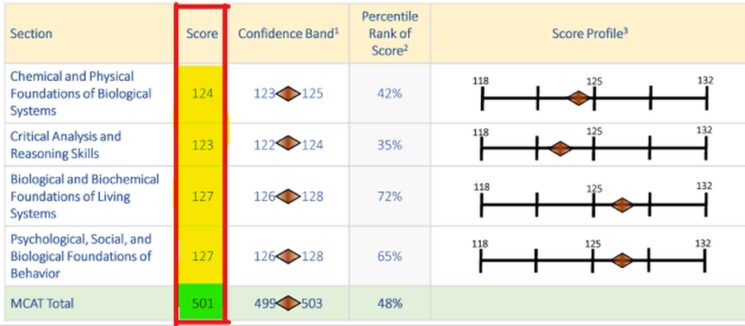It’s not easy to pursue a career in medicine. To keep going until you receive your medical practitioner license, you must be persistent and committed. However, you must pass their notoriously difficult admission exams before you can enroll in any medical school.
The two most frequently used entrance exams for all medical specialties, as well as optometry schools, are the MCAT and OAT. These two tests are intended to evaluate your knowledge, abilities, and level of preparation for admission to optometry or medical school.
This article will go through the differences between MCAT and OAT.
In This Post
What is the MCAT Test?

More than merely a requirement for medical school admissions, the Medical College Admission Test, or MCAT, is an important exam. Admission to medical schools in the US and Canada is determined by a multiple-choice, computer-based exam.
The MCAT is created and administered by the test-creator Association of American Medical Colleges (AAMC) to give medical schools standard metrics for assessing applicants’ credentials and level of readiness for medical school. The MCAT score, together with your academic record and supporting papers, are taken into consideration by the admissions committees of medical schools when determining if you have the necessary foundation to succeed in the medical field.
What is the OAT Test?
All accredited optometry schools in the US require candidates to take the OAT exam. It’s one of the most important factors that admissions committees consider when making a choice. The majority of institutions require top scores in the 300s, while each institution has its specific standards. Successful OAT exam takers are more likely to receive an invitation for an admissions interview.
The OAT is made to gauge overall academic aptitude as well as the two abilities that future optometrists would need, scientific understanding and analytical prowess. It accomplishes this by evaluating your comprehension of what you read and your reading comprehension and quantitative thinking abilities.
Eligibility Requirements For MCAT Exam
You must intend to apply to a school for the health professions to be eligible to take the MCAT exam. Also required for international students is enrollment or possession of an MBBS degree. One must send an email to [email protected] specifying the reason for taking the exam to get special permission. The MCAT program office will next evaluate the request in accordance with its findings, examine it, and respond in five business days, on average. It is advised that potential candidates remember the pertinent registration deadlines.
Eligibility Requirements For OAT Exam
The OAT Program does not consider race, religion, ethnicity, gender, age, sexual orientation, or marital status. Successful applicants to the OAT Program must complete at least one year of college work, including biology and general and organic chemistry courses. Higher-level biology and physics are not required. Most applicants had already finished two or more years of college before taking the test.
It is advised that potential optometry students take the OAT well before the application date. Candidates for admission to Canadian optometry programs should make sure such programs accept the OAT before taking it.
How Are MCAT Scores Determined?

The number of questions you correctly answer determines your performance on the MCAT. The MCAT is scaled and equated rather than graded on a curve so that results matter equally regardless of when you take the test. Additionally, there is no deduction for incorrect responses, so it’s critical to respond to every MCAT question, even if you have to make an educated guess, to optimize your score.
A total of five scores—one scaled score for each of the four sections of the MCAT exam and one combined total scaled score—will be given to you.
How Are OAT Scores Determined?
Candidates are not penalized for guessing on the OAT, which bases scores on the number of right answers received.
The OAT is not graded on a curve, and the results are given in standard scores that give normative data about the knowledge or problem-solving abilities that examinees have shown. This enables a direct comparison of an examinee’s abilities with those of other examinees.
The OAT position of an applicant compared to other test-takers is expressed using percentile ranks. Remember that a candidate’s percentile rank alone does not indicate whether or not they will be admitted to an optometry school. Percentile rankings fluctuate and are based on the annual number of test administrations.
What’s a Good MCAT Score?
The number of questions you correctly respond to determines your score. You are not penalized for providing a wrong answer because it has no bearing on your score. When taking the test, respond to every question, even if you are unsure of the response. It is best to hazard a guess.
Each section’s correct responses are turned into a scaled score, with the lowest possible score being 118 and the highest score being 132. (highest possible score). The results of the four sections’ scores are combined. Accordingly, the lowest MCAT score you might receive is 472, and the best is 528.
What’s a Good OAT Score?

In general, it is recommended to approach the OAT with a high standard of preparation. To be admitted to an optometry program, your OAT score must be good enough, but this is determined by a number of other variables.
The level of competition is one element; your performance in relation to other test-takers determines your percentile position and score. Although percentile rankings are not the only factor considered in admission choices, they offer a benchmark for applicant comparison. It would be better to aim for a score of more than 320+. You should try for a score of above 350+ for more selective schools.
Conclusion
You must therefore think like a medical student to do well on the MCAT and OAT. You must change the way you study from what you did as a premed all these years.
You must pick up new study techniques. Long-term remembering tactics, test-taking procedures, study tips, questions based on passages, response evaluation strategies, and more.
The best part—which is difficult for you to realize right now—is that by using these tactics, you’ll begin to think critically and use stronger logic and good reasoning. In other words, you’ll be preparing yourself to fill the role of the medical expert you were born to play.